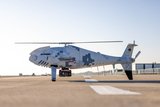Terma SCANTER radars selected for RN OPVs
BAE Systems has selected the Terma SCANTER 4100 radar system for the three River Class offshore patrol vessels (OPVs) currently under construction for the Royal Navy.
Terma announced the radar’s selection on 17 December.
The SCANTER 4100 radar provides close-in and stand-off target detection in adverse weather conditions against air and surface targets. It also provides situational awareness for the vessel and can interface with other onboard sensors, such as command management systems, Fire Control Systems, or dedicated radar console.
Terma will deliver the first radar system, including stabilised platforms and antenna, in 2016.
Jens Maaløe, president and CEO, Terma, said: ‘We are proud that the Royal Navy and BAE Systems has selected Terma as their supplier of radar solutions for these OPVs. This is an invaluable sign of trust and a stamp of quality for our products.’
BAE Systems began production of the River Class OPVs in October 2014. The first of class is expected to be delivered in 2017. The 90 meter, 2,000 tons vessels will play a key role in protecting UK interests both at home and abroad. With a maximum speed of 24 knots, a range of over 5,000 nautical miles and helicopter landing capability, the ships will be globally deployable and capable of ocean patrol.
More from Naval Warfare
-
![BMT and DNV partner to meet Australia’s heavy landing craft requirement]()
BMT and DNV partner to meet Australia’s heavy landing craft requirement
Under Project Land 8710 Phase 2, Australia has been seeking to acquire an undisclosed number of Littoral Manoeuvre Vessels to replace the Balikpapan-class. The programme has an estimated value of AU$1.4 billion (US$910 million), with IOC slated for 2032.
-
![Babcock to take over upkeep of Royal Navy Type-23 frigates]()
Babcock to take over upkeep of Royal Navy Type-23 frigates
The Royal Navy’s Type-23 Duke-class frigates for the UK Royal Navy were designed as anti-submarine warfare (ASW) ships but now have a multi-role function. Of the 16 Type 23s built, 12 remain in service with the Royal Navy and will be replaced by the Type-26 frigates before 2035.
-
![Austal completes autonomy trials with former Royal Australian Navy patrol boat]()
Austal completes autonomy trials with former Royal Australian Navy patrol boat
The work took place under the Patrol Boat Autonomy Trial (PBAT), which has been a collaboration between Austal, Greenroom Robotics, the Trusted Autonomous Systems Defence Cooperative Research Centre and the Royal Australian Navy’s (RAN) Warfare Innovation Navy Branch.
-
![Singapore launches fourth and final Type 218SG submarine]()
Singapore launches fourth and final Type 218SG submarine
The era of southeast Asian submarine modernisation has been in full swing fuelled by growing tensions in the South China Sea.
-
![Keel laid for third Hellenic Navy frigate as harbour trials start for first]()
Keel laid for third Hellenic Navy frigate as harbour trials start for first
On 24 March 2022, Greece and Naval Group have signed a contract for three defence and intervention (FDI) frigates. Two warships will be due for delivery in 2025 and the third expected the following year, with the deal including an option to add a fourth frigate to be ready in 2027.
























